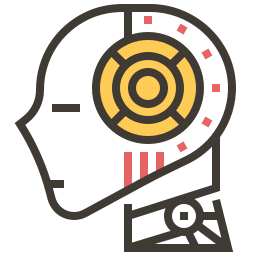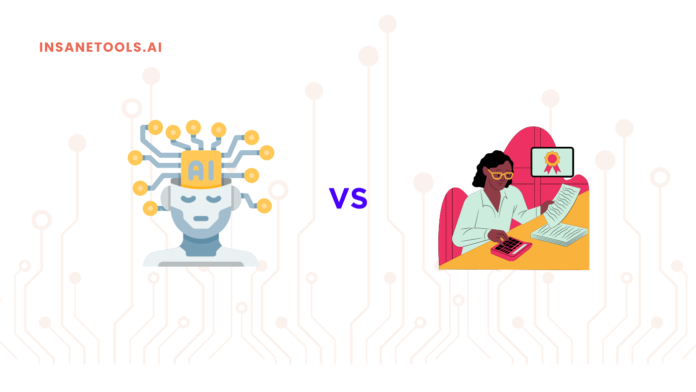Welcome to the world of accounting, where numbers and finances intersect to drive businesses forward. As technology continues to advance at an astonishing pace, the role of artificial intelligence (AI) in various industries has become a topic of great interest and speculation. One profession that often finds itself at the center of this discussion is accounting.
Traditionally, accountants have been entrusted with the vital task of managing financial records, analyzing data, and providing valuable insights to support decision-making processes. However, with the advent of AI and its ability to automate repetitive tasks, improve data accuracy, and perform complex computations in seconds, questions arise regarding the future of accounting as a profession.
In this post, we will delve into the evolving relationship between accountants and AI, exploring the rise of AI in the accounting landscape, its impact on accounting jobs, and ultimately, answering the question: will accountants be replaced by AI? While the integration of AI undoubtedly brings about significant changes, we will also discuss how accountants can embrace this technological shift and harness its potential to drive innovation in the field of accounting.
So, let’s embark on a journey through the fascinating world of accounting and AI, as we explore the possibilities, challenges, and opportunities that lie ahead. Together, we’ll uncover what the future holds for accountants and how they can adapt and thrive in an AI-powered era.

Understanding the Role of AI in Accounting
AI has emerged as a transformative force in various industries, and accounting is no exception. To comprehend the impact of AI on the field of accounting, it is crucial to understand its role and capabilities within this domain.
AI, at its core, replicates human intelligence in machines programmed to execute tasks that usually demand human cognitive capabilities. In the field of accounting, AI algorithms and systems can be tailored to manage diverse activities such as data entry, transaction categorization, financial analysis, and report generation.
One of the key strengths of AI in accounting is its ability to automate repetitive and time-consuming tasks. Mundane activities like data entry and reconciliation, which were once performed manually, can now be accomplished swiftly and accurately by AI-powered software. This not only saves valuable time but also minimizes the risk of human errors inherent in manual processes.
Furthermore, AI algorithms can analyze vast amounts of financial data, detect patterns, and identify anomalies with remarkable precision. This analytical prowess empowers accountants to extract valuable insights from complex datasets, facilitating better decision-making and strategic planning. AI can also aid in forecasting financial trends, identifying potential risks, and optimizing resource allocation, enhancing the overall financial management capabilities of organizations.
In short, the role of AI in accounting is multifaceted. It streamlines processes, improves accuracy, enables sophisticated data analysis, and empowers accountants to evolve into trusted advisors. By embracing AI technologies, accountants can leverage their potential to enhance efficiency, make informed decisions, and drive value for their clients and organizations.
The Rise of AI in Accounting

In the last ten years, the accounting industry has experienced a notable surge in AI adoption. This remarkable progress can be credited to various factors that have transformed AI from a mere concept into a practical reality within accounting.
One of the primary drivers of AI’s ascent in accounting is the exponential growth of digital data. With the increasing digitization of financial transactions, businesses now generate vast amounts of data on a daily basis. Traditional manual methods of processing and analyzing this data are no longer sufficient to keep pace with the demands of modern business environments. AI technologies, with their ability to handle massive datasets and extract meaningful insights, have become invaluable in managing this data deluge.
The evolution of cloud computing has also played a significant role in the rise of AI in accounting. Cloud-based accounting software has become widely accessible, providing accountants with powerful tools that harness AI capabilities. These platforms leverage machine learning algorithms to automate routine tasks, such as invoice processing, bank reconciliation, and expense categorization. As a result, accountants can redirect their efforts toward higher-value activities that require their expertise.
Furthermore, advancements in natural language processing (NLP) have paved the way for AI-powered virtual assistants and chatbots in the accounting domain. These intelligent assistants can understand and respond to human queries, assist with financial inquiries, provide real-time insights, and even facilitate automated interactions with clients. Such technologies not only enhance efficiency but also improve customer service and satisfaction.
The rise of AI in accounting is also driven by the increasing affordability and accessibility of AI technologies. Previously, AI applications were primarily accessible to large enterprises with substantial budgets. However, with advancements in technology and increased competition, AI-powered accounting solutions have become more affordable and scalable, making them accessible to businesses of all sizes.
However, the rise of AI in accounting does raise concerns and challenges. As AI takes over certain tasks, there is apprehension about the potential displacement of human accountants.
The Impact of AI on Accounting Jobs
The integration of AI in the accounting field has undoubtedly brought about significant changes in the nature of accounting jobs. As AI technologies continue to advance, it is natural to question the potential impact on the role of human accountants.
While automation and AI-driven systems can handle many routine accounting tasks with greater speed and accuracy, the impact on accounting jobs is not simply a matter of replacement. Instead, it involves a transformation of the profession and the way accountants work.
- Automation of Routine Tasks: AI has the ability to automate repetitive and rule-based tasks traditionally performed by accountants. This includes activities such as data entry, invoice processing, and basic bookkeeping. By automating these tasks, AI frees up accountants’ time, allowing them to focus on more complex and strategic activities.
- Enhanced Efficiency: AI-powered accounting software can process large volumes of data and perform complex calculations in a fraction of the time it would take a human. This improved efficiency enables accountants to handle larger workloads and provide more timely and accurate financial information to clients and decision-makers.
- Shifting Skill Requirements: As AI takes over routine tasks, the skill set required for accountants is evolving. While proficiency in traditional accounting principles and practices remains essential, there is an increasing demand for expertise in data analysis, interpreting AI-generated insights, and strategic thinking. Accountants need to adapt and acquire new skills to effectively leverage AI technologies and collaborate with intelligent systems.
- Role as Strategic Advisors: With routine tasks automated, accountants can devote more time to value-added activities. They can provide strategic guidance to businesses, leveraging AI-generated insights to identify financial opportunities, mitigate risks, and optimize financial performance. Accountants become trusted advisors, utilizing their expertise and human judgment to interpret and contextualize the information provided by AI systems.
- Emphasis on Soft Skills: While AI can analyze data and generate insights, it lacks the ability to empathize, communicate effectively, and build relationships. These interpersonal and communication skills are areas where human accountants excel. Accountants can leverage their soft skills to collaborate with clients, understand their unique needs, and provide personalized financial advice.
Will Accountants Be Replaced by AI?

The question of whether accountants will be replaced by AI is a topic of considerable debate and speculation. While AI has undoubtedly transformed certain aspects of the accounting profession, the notion of complete replacement is both unrealistic and misleading. Here’s why:
Complex Decision-Making and Professional Judgment
Accounting involves intricate decision-making processes that require professional judgment, ethical considerations, and critical thinking. While AI can assist in providing data-driven insights, it lacks the ability to fully comprehend the contextual nuances and exercise the human judgment necessary for complex financial decisions. Accountants bring valuable expertise and experience to the table, bridging the gap between data analysis and real-world implications.
Adaptability and Problem-Solving
Accounting is not solely about number crunching; it requires adaptability and problem-solving skills. Accountants encounter unique challenges and uncertainties in their work, and they must navigate through complex scenarios that may not have a clear-cut answer. The ability to think creatively, adapt to changing circumstances, and devise innovative solutions is a distinct human capability that cannot be easily replicated by AI.
Client Relationships and Communication
Building strong client relationships is an integral part of the accounting profession. Accountants often serve as trusted advisors, providing financial guidance, and understanding the unique needs of their clients. Effective communication, empathy, and interpersonal skills are essential in establishing rapport and ensuring client satisfaction. These human qualities are key differentiators that set accountants apart from AI-driven systems.
Ethical Considerations and Regulatory Compliance
Accounting professionals are bound by ethical standards and regulatory frameworks that govern their practice. These guidelines encompass integrity, confidentiality, and professional responsibility. Accountants are responsible for ensuring compliance with regulations and ethical principles, providing a level of oversight and accountability that goes beyond the capabilities of AI.
Continuous Learning and Adaptation
The accounting field is dynamic, with ever-evolving financial regulations, industry practices, and technological advancements. Accountants must stay updated with these changes, continually enhancing their knowledge and skills. AI itself is not static and requires ongoing maintenance and updates. Accountants can leverage their ability to learn and adapt to embrace new technologies, including AI, and utilize them to their full potential.
In summary, while AI has undoubtedly impacted the accounting profession, the idea of complete replacement is far from reality. Accountants bring a unique blend of expertise, critical thinking, ethical considerations, and interpersonal skills that are essential in the complex landscape of financial management. Instead of viewing AI as a threat, accountants can embrace it as a powerful tool that enhances their capabilities, automates routine tasks, and allows them to focus on higher-level responsibilities.
Embracing the Future of Accounting
As the accounting profession continues to evolve in the era of AI, it is crucial for accountants to embrace the future and harness the potential of AI to drive innovation and enhance their roles. Here are some key strategies for accountants to embrace the changing landscape:
- Continuous Learning and Skill Development: To stay relevant and thrive in an AI-powered accounting environment, accountants must prioritize continuous learning and skill development. This includes expanding knowledge in emerging technologies, data analytics, and AI applications in accounting. By investing in professional development and staying abreast of industry trends, accountants can adapt to the changing demands of the profession.
- Collaborating with AI Systems: Instead of perceiving AI as a competitor, accountants should view it as a collaborative tool. Embrace AI-powered accounting software and platforms that automate routine tasks, streamline processes, and generate valuable insights. By leveraging these technologies, accountants can focus their efforts on higher-level analysis, interpretation of results, and strategic decision-making.
- Data-driven Decision Making: AI excels at analyzing large volumes of data and identifying patterns and trends. Accountants can harness this capability by utilizing AI-generated insights to make informed decisions and provide valuable recommendations to clients and organizations. Emphasize the importance of data quality, data integrity, and data-driven decision-making processes.
- Enhancing Communication and Interpersonal Skills: While AI can handle data analysis, accountants possess valuable communication and interpersonal skills that are essential in client interactions. Strengthening these skills becomes increasingly important in building trust, understanding client needs, and effectively conveying financial information. Develop strong communication skills to complement the analytical capabilities of AI systems.
- Embracing Ethical Considerations: As AI becomes more integrated into accounting processes, ethical considerations become paramount. Accountants must understand the ethical implications of AI, ensure data privacy, maintain professional confidentiality, and navigate potential biases in AI algorithms. Uphold ethical standards, monitor AI systems’ outputs, and critically evaluate the ethical implications of AI-driven decisions.
- Emphasizing Professional Judgment: AI systems excel at data analysis but lack the ability to exercise professional judgment and contextual understanding. Accountants should emphasize their role in providing professional judgment, considering the broader implications of financial decisions, and offering insights beyond what AI systems can deliver. Accountants’ expertise and critical thinking skills remain invaluable in the accounting profession.
- Embracing Lifelong Learning: The rapid advancements in AI and technology necessitate a mindset of lifelong learning. Accountants should actively seek opportunities to learn about AI advancements, attend conferences, participate in training programs, and engage in professional networks. By embracing a learning mindset, accountants can adapt to new technologies, explore innovative solutions, and proactively shape the future of the accounting profession.
The future of accounting lies in the integration of AI technologies and human expertise. By embracing the potential of AI, continuously developing relevant skills, leveraging data-driven insights, and emphasizing professional judgment and communication skills, accountants can position themselves as trusted advisors and valuable contributors in the evolving accounting landscape.
AI and Accounting Software

The integration of AI in accounting software has revolutionized the way accountants handle financial data, streamline processes, and extract valuable insights. AI-powered accounting software has become increasingly prevalent, offering a wide range of benefits and transforming the efficiency and effectiveness of accounting operations. Here are some key aspects of AI and accounting software:
- Automation of Routine Tasks: AI-powered accounting software automates time-consuming and repetitive tasks that were traditionally performed manually. Activities such as data entry, bank reconciliation, and invoice processing can now be accomplished swiftly and accurately with the help of AI algorithms. This automation not only streamlines processes and enhances efficiency but also mitigates the potential for errors inherent in manual procedures.
- Streamlined Data Processing and Analysis: AI algorithms can process large volumes of financial data with remarkable speed and accuracy. They can categorize transactions, identify patterns, and detect anomalies, enabling accountants to gain deeper insights into financial information. AI-powered accounting software can perform complex calculations, generate reports, and provide real-time data analysis, empowering accountants to make informed decisions and drive strategic financial management.
- Improved Efficiency and Productivity: AI-powered accounting software enhances overall efficiency and productivity by automating routine tasks and streamlining data processing. Accountants can focus on higher-value activities that require their expertise, such as data interpretation, financial analysis, and strategic planning. This shift allows accountants to allocate their time and efforts toward activities that add greater value to their clients and organizations.
- Enhanced Accuracy and Error Reduction: Human errors are inherent in manual accounting processes. However, AI-driven accounting software significantly reduces the risk of errors by minimizing manual data entry and automating calculations. This enhanced accuracy ensures the integrity of financial data and financial statements, providing more reliable information for decision-making purposes.
- Customization and Personalization: AI-powered accounting software often offers customization options to meet the unique needs of businesses and individual clients. It can adapt to specific industry requirements, regulatory frameworks, and reporting standards. Additionally, AI algorithms can learn from user interactions and preferences, providing personalized recommendations and insights tailored to specific accounting needs.
- Scalability and Accessibility: Cloud-based AI-powered accounting software offers scalability and accessibility to businesses of all sizes. It eliminates the need for extensive IT infrastructure and allows for remote access to financial data, collaboration, and real-time updates. The scalability of AI systems ensures that they can handle growing volumes of data and adapt to changing business requirements.
- Data Security and Privacy: With the integration of AI, data security and privacy become critical considerations. AI-powered accounting software must adhere to stringent data protection protocols, ensuring the confidentiality and integrity of financial information. Accountants should prioritize selecting reputable software providers that employ robust security measures to safeguard sensitive data.
Conclusion
The integration of AI in accounting has brought about significant changes and advancements in the profession. AI-powered technologies have automated routine tasks, streamlined data processing and analysis, and provided real-time insights, transforming the way accountants work and adding value to their services.
While there is an ongoing discussion about the potential replacement of accountants by AI, it is important to recognize that human accountants play an indispensable role in the accounting landscape. Their critical thinking, professional judgment, interpretation of AI-generated insights, strategic planning abilities, client communication skills, ethical considerations, continuous learning, and collaborative problem-solving capabilities are vital for delivering comprehensive financial services and driving innovation.
Rather than viewing AI as a threat, accountants can embrace it as a tool that enhances their capabilities. AI-powered accounting software enables accountants to automate routine tasks, allocate more time to value-added activities, and provide strategic financial advice based on real-time data analysis. The collaboration between humans and AI in accounting partnerships brings about synergies that maximize efficiency, accuracy, and productivity.
As the profession evolves, accountants should proactively adapt to technological advancements, actively participate in the development and fine-tuning of AI algorithms, and continuously enhance their skills. By embracing AI, accountants can position themselves as trusted advisors, leveraging AI-generated insights to make informed decisions, navigate complex financial scenarios, and drive business growth.
To sum up, the future of accounting relies on the successful collaboration between human accountants and AI technologies. Together, they can revolutionize the profession, improve client services, and shape the way financial management is handled. By utilizing the strengths of both humans and intelligent systems, accountants can embrace AI’s potential and lead the way toward a more efficient, accurate, and insightful accounting industry.
Thank you for joining me on this journey to explore the role of AI in accounting and the future of the profession. If you have any further questions or would like to delve deeper into this topic, please refer to the FAQs section below or reach out to me directly.
FAQs
Q1: Will accountants be replaced by AI?
A: AI is unlikely to replace accountants completely. While it can automate tasks, the analytical and judgment-based aspects of accounting require human expertise.
Q2: How can AI benefit accountants?
A: AI automates tasks, provides real-time insights, and enhances efficiency and accuracy, allowing accountants to focus on higher-value activities and deliver better services.
Q3: What is the impact of AI on accounting jobs?
A: AI transforms accounting jobs by automating routine tasks, enabling accountants to take on more strategic and analytical roles.
Q4: How can accountants prepare for the future of accounting?
A: Accountants should embrace technology, stay updated, enhance skills, and cultivate collaboration and interpretation abilities.
Q5: Is AI secure and reliable for accounting purposes?
A: AI can be secure and reliable when implemented with reputable providers and robust security measures.
Q6: How can AI and human accountants work together effectively?
A: Collaboration requires clear objectives, monitoring, training, and balancing AI’s capabilities with human judgment and ethical considerations.
Q7: What are the ethical considerations in AI-powered accounting?
A: Ethical considerations include data privacy, transparency, compliance with professional standards, and making decisions in the best interests of clients.
Q8: How can accountants embrace AI while maintaining their professional value?
A: Accountants can leverage AI as a tool to enhance capabilities, focus on higher-value tasks, and continuously learn and communicate effectively with clients.
